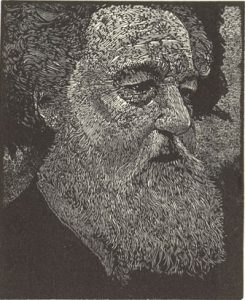
William Morris was a designer of stained glass, tapestries, wallpaper, chintzes, furniture, books, and typefaces. He was also a preservationist, socialist, poet, novelist, lecturer, calligrapher, translator of classic Icelandic and early English sagas, and founder of the Kelmscott press. He was born in 1834, and died at 62 in 1896, due to (according to his physician); “simply being William Morris, and having done more work than most ten men.” Morris became involved with socialist causes in the late 1870s. He found it impossible to separate esthetic issues from social and political ones, to him social reform was simply an extension of his arts and crafts production.
Morris’s obituary in The New York Times stresses the variety of his life and work, the “unusual combination of manufacture and literature that he seemed to have a sort of dual existence in the eyes of the public. His poems were ‘by Morris, the wallpaper maker,’ his wallpapers, ‘by Morris, the poet’.”
